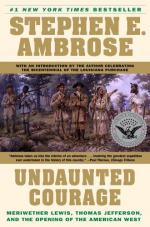
|
1. What in Lewis' childhood may have contributed to his later accomplishments?
His family had military ties and important friends. Lewis was educated and given great responsibility for the plantation and, perhaps for his mother until she remarried. He had opportunities for experiences that inspired him to explore, and an innate love of nature.
2. Describe the irony in Lewis' attitude toward Native Americans and African Americans.
Lewis believed that Indians could be civilized and educated,, and eventually assimilated into the white mans' culture. However, he does not believe African Americans are capable or smart enough to ever attain an equal footing. There is some indication that he sees blacks as lazy, and clearly sees them as inferior intellectually. He viewed the Indians, however, as noble savages, not taking into account that the Indians had been free for centuries, or the fact that the black slaves were in captivity and treated like animals. Slaves were considered to be farm equipment and sub-human, whereas Indians had their own distinct cultures, art, survival practices and hierarchies. Perhaps the structure of the Indian civilizations made them more respectable to Lewis, since he had no knowledge of any such tribal structures in Africa, nor did he ever know a black person who was not a slave.
(read all 60 Short Essay Questions and Answers)
|
This section contains 5,835 words (approx. 20 pages at 300 words per page) |

|




